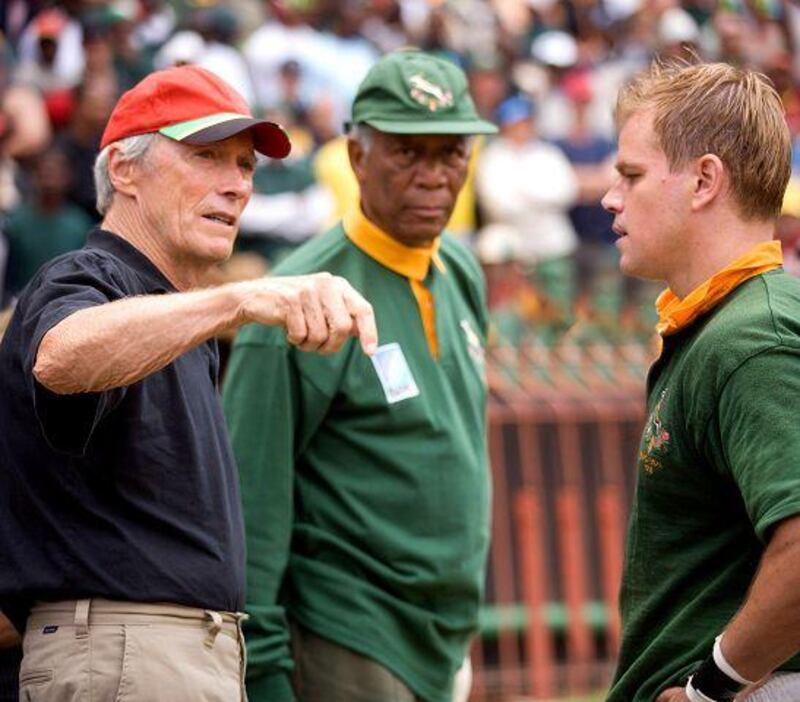JOHANNESBURG// The stadium at Ellis Park, on the edge of Johannesburg's decaying central business district, rarely plays host to a full house nowadays. It is the home ground of the Gauteng Lions, one of the weaker teams in rugby's Super 14 international championship, and there are so many empty seats on match days that their long-suffering supporters can largely choose wherever they wish to sit.
It was a very different scene on June 24, 1995, little more than a year after South Africa's transition to democracy, when it played host to the Rugby World Cup final, and one of the most memorable moments in both sport and the country's recent history. The Springboks, the South African national rugby team, had for decades under apartheid been an all-white side and, coupled with Afrikaners' adoration of the sport, seen as a symbol of white supremacy by the country's oppressed black majority, who used to cheer their opponents whenever they played an international match.
With racial tensions still rife and the country still assailed by self-doubt over its future, Nelson Mandela chose the moment to make his greatest gesture of reconciliation, donning a Springbok jersey to go on to the pitch and greet the team. There were 65,000 people packing the stands to the rafters, many of them Afrikaners who for years considered him to be a terrorist. But now they erupted into chanting his name over and over again.
In Playing the Enemy, a book on the match by the British journalist John Carlin, Linga Moonsamy, one of Mr Mandela's bodyguards, said: "I was absolutely blown away by what it meant politically." The book has now been adapted into a Clint Eastwood film, Invictus, starring Morgan Freeman as Mr Mandela and Matt Damon as Francois Pienaar, the South African team captain. After the Springbok match, when Mr Mandela, the prison inmate turned head of state, went back on to the pitch to present the Webb Ellis Cup to the winning captain, Pienaar, Van Zyl Slabbert, a liberal Afrikaner, described "the faces of these Boers all around me. I remember looking at one of them and there were tears rolling down his face and he kept saying, in Afrikaans, 'That's my president - That's my president'."
"Francois, thank you very much for what you have done for our country," Mr Mandela told the player. "No, Mr President," came the reply. "Thank you for what you have done for our country." That night South Africans of all colours partied together long and hard in celebration of the victory. "From that day on we knew everything was going to be all right," John Robbie, a radio talk-show host, told Carlin.
Invictus, which opens with the Warner Brothers logo in black and white rather than the more familiar blue and yellow, was released in South Africa last weekend, to critical and popular acclaim. Freeman in particular has been described as having been "born to play" Mr Mandela, whose gait and mannerisms he captures brilliantly, while Damon's South African accent, long a complaint of citizens watching foreigners portray them, has been praised for its accuracy.
Freeman and Damon were nominated for Golden Globe awards yesterday. The awards, chosen by the Hollywood Foreign Press Association, are seen as predictors of the Oscars. Unlike most sporting movies, the action scenes - with the exception of two foul kick-offs that somehow survived the editing suite - are remarkably realistic. But the film has also prompted questions over whether the promise of that day has been fulfilled.
Last week a survey was released showing that only half of South Africans believe that race relations are better than they were under apartheid, an extraordinary statistic. According to the South African Reconciliation Barometer, 46 per cent of people never socialise with people of other races in their own homes or those of friends. "While this is symptomatic of a lack of progress in social integration, it also speaks to continued physical separation and exclusion," said the Cape Town-based Institute for Justice and Reconciliation, the think tank that compiled the survey.
After watching Invictus at a cinema in Johannesburg, Khotso Khasu, 43, who runs an engineering company, said: "It's a story of the human triumph over evil. Our problems during those years were quite enormous and all of us were despondent and suspicious about one another." At Ellis Park, he went on, "we were united under one banner that became a bond for us in South Africa. We saw things as human beings, not separate individuals and separate nationalities. It brings a lot of emotions for those of us who were part of this struggle."
But he said racial reconciliation was "still a work in progress. We don't need to rest, we need to continue to build this country for everybody, black and white." Nick Kucer, 53, an aviator from Germiston, east of Johannesburg, said the film captured the emotions of the time brilliantly, admitting sheepishly that the World Cup final was the first time he had had a mixed-race party at his house. "We have lost the momentum that was built in that time with the racial harmony," he said. "We really were the rainbow nation and we have lost some of that because we haven't had a leader like that [since then]. It takes a very special person."
@Email:sberger@thenational.ae





